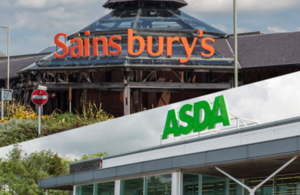Sainsbury’s / Asda merger could push up prices and reduce quality
The CMA has provisionally found extensive competition concerns as part of its in-depth investigation of the proposed merger between Sainsbury’s and Asda.

At this stage in its Phase 2 investigation, the Competition and Markets Authority (CMA) has found that the proposed deal could lead to a worse experience for in-store and online shoppers across the UK through higher prices, a poorer shopping experience, and reductions in the range and quality of products offered. It also has concerns that prices could rise at a large number of Sainsbury’s and Asda petrol stations.
The CMA has provisional concerns that the merger could lead to a substantial lessening of competition at both a national and local level. The combined impact means that people could lose out right across the UK and that the deal could also cost shoppers through reduced competition in particular areas where Sainsbury’s and Asda stores overlap.
Stuart McIntosh, chair of the independent inquiry group carrying out the investigation, said:
These are 2 of the biggest supermarkets in the UK, with millions of people purchasing their products and services every day. We have provisionally found that, should the two merge, shoppers could face higher prices, reduced quality and choice, and a poorer overall shopping experience across the UK. We also have concerns that prices could rise at a large number of their petrol stations.
These are our provisional findings, however, and the companies and others now have the opportunity to respond to the analysis we’ve set out today. It’s our responsibility to carry out a thorough assessment of the deal to make sure that the sector remains competitive and shoppers don’t lose out.
As well as concerns for people shopping in their stores, the CMA is concerned the merger could drive up prices and reduce the quality of service for online customers.
It also believes the deal could lead to inflated fuel costs at more than 100 locations where Sainsbury’s and Asda petrol stations overlap.
The CMA has set out potential options for addressing its provisional concerns. These include blocking the deal or requiring the merging companies to sell off a significant number of stores and other assets – potentially including one of the Sainsbury’s or Asda brands – to recreate the competitive rivalry lost through the merger. The CMA’s current view is that it is likely to be difficult for the companies to address the concerns it has identified.
The CMA now welcomes responses from interested parties to its provisional findings by 13 March 2019 and its notice of possible remedies by 6 March 2019. The CMA’s final report will be issued by 30 April 2019.
Further details are available on the Sainsbury’s / Asda case page.
Notes to editors
-
The CMA is the UK’s primary competition and consumer authority. It is an independent non-ministerial government department with responsibility for carrying out investigations into mergers, markets and the regulated industries and enforcing competition and consumer law. For CMA updates, follow us on Twitter, Facebook, and LinkedIn.
-
Certain of the CMA’s functions in phase 2 merger inquiries are performed by independent inquiry groups chosen from the CMA’s panel members. The appointed inquiry group are the decision-makers on phase 2 inquiries. The members of the inquiry group are: Stuart McIntosh (Inquiry Chair), Richard Feasey, Roland Green, John Thanassoulis, and Claire Whyley. The CMA’s panel members come from a variety of backgrounds, including economics, law, accountancy and/or business; the membership of an inquiry group usually reflects a mix of expertise and experience.
-
There is now a 3-week consultation period on the provisional findings, during which time anyone may make submissions to the CMA. Submissions should be made to [email protected] and received by 13 March 2019. There is a 2-week consultation period on the notice of possible remedies. Submissions on this should be made to [email protected] and received by 6 March 2019.
-
Media enquiries to the CMA should be directed to [email protected] or 020 3738 6460.